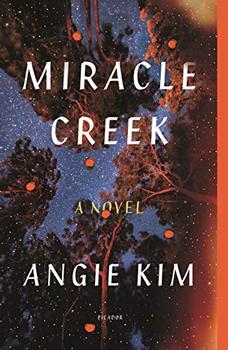Summary | Excerpt | Reading Guide | Discuss | Reviews | Beyond the Book | Readalikes | Genres & Themes | Author Bio

The courthouse was at the base of a knoll, flanked by grapevines planted in straight lines up the hill. The geometric precision provided a measured calm, and it seemed fitting that a building of justice would stand amid the ordered rows of vines.
That morning, gazing at the courthouse, its tall white columns, Young had thought how this was the closest she'd been to the America she'd expected. In Korea, after Pak decided she should move to Baltimore with Mary, she'd gone to bookstores and looked through pictures of America—the Capitol, Manhattan skyscrapers, Inner Harbor. In her five years in America, she hadn't seen any of those sights. For the first four years, she'd worked in a grocery store two miles from Inner Harbor, but in a neighborhood people called the "ghetto," houses boarded up and broken bottles everywhere. A tiny vault of bulletproof glass: that had been America for her.
It was funny how desperate she'd been to escape that gritty world, and yet she missed it now. Miracle Creek was insular, with longtime residents (going back generations, they said). She thought they might be slow to warm, so she focused on befriending one family nearby who'd seemed especially nice. But over time, she realized: they weren't nice; they were politely unfriendly. Young knew the type. Her own mother had belonged to this breed of people who used manners to cover up unfriendliness the way people used perfume to cover up body odor—the worse it was, the more they used. Their stiff hyperpoliteness—the wife's perpetual closed-lip smile, the husband's ma'am at the beginning or end of every sentence—kept Young at a distance and reinforced her status as a stranger. Although her most frequent customers in Baltimore had been cantankerous, cursing and complaining about everything from the prices being too high to the sodas too warm and deli meats too thin, there was an honesty to their rudeness, a comfortable intimacy to their yelling. Like bickering siblings. Nothing to cover up.
After Pak joined them in America last year, they'd looked for housing in Annandale, the D.C. area's Koreatown—a manageable drive from Miracle Creek. The fire had stopped all that, and they were still in their "temporary" housing. A crumbling shack in a crumbling town far from anything pictured in the books. To this day, the fanciest place Young had been in America was the hospital where Pak and Mary had lain for months after the explosion.
* * *
THE COURTROOM WAS LOUD. Not the people—the victims, lawyers, journalists, and who knew who else—but the two old-fashioned window-unit air conditioners on opposite sides behind the judge. They sputtered like lawn mowers when they switched on and off, which, because they weren't synchronized, happened at different times—one, then the other, then back again, like some strange mechanical beasts' mating calls. When the units ran, they rattled and hummed, each at a slightly different pitch, making Young's eardrums itch. She wanted to stick her pinkie deep inside her ear into her brain and scratch.
The lobby plaque said the courthouse was a 250-year-old historical landmark and asked for donations to the Pineburg Courthouse Preservation Society. Young had shaken her head at the thought of this society, an entire group whose sole purpose was to prevent this building from becoming modern. Americans were so proud of things being a few hundred years old, as if things being old were a value in and of itself. (Of course, this philosophy did not extend to people.) They didn't seem to realize that the world valued America precisely because it was not old, but modern and new. Koreans were the opposite. In Seoul, there would be a Modernization Society dedicated to replacing this courthouse's "antique" hardwood floors and pine tables with marble and sleek steel.
"All rise. Skyline County Criminal Court now in session, the Honorable Frederick Carleton III presiding," the bailiff said, and everyone stood. Except Pak. His hands clenched his wheelchair's armrests, the green veins on his hands and wrists popping up as if willing his arms to support his body's weight. Young started to help, but she stopped herself, knowing that needing help for something basic like standing would be worse for him than not standing at all. Pak cared so much about appearances, conforming to rules and expectations—the quintessentially Korean things she'd strangely never cared about (because her family's wealth afforded her the luxury of being immune to them, Pak would say). Still, she understood his frustration, being the lone sitting figure in this towering crowd. It made him vulnerable, like a child, and she had to fight the urge to cloak his body with her arms and hide his shame.
Excerpted from Miracle Creek by Suki Kim. Copyright © 2019 by Suki Kim. Excerpted by permission of Sarah Crichton Books. All rights reserved. No part of this excerpt may be reproduced or reprinted without permission in writing from the publisher.
Your guide toexceptional books
BookBrowse seeks out and recommends the best in contemporary fiction and nonfiction—books that not only engage and entertain but also deepen our understanding of ourselves and the world around us.